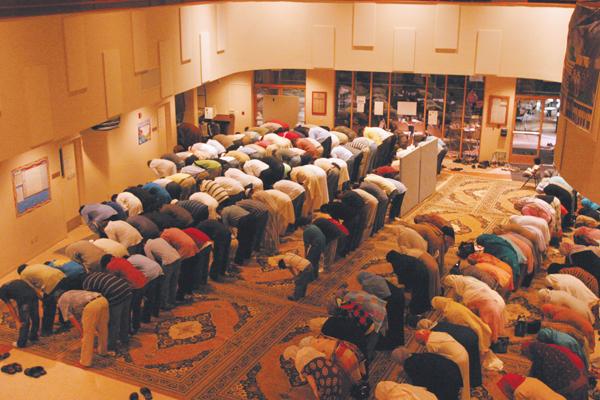Fasting at dawn

More than 300 Muslims attended prayer at Salam, a Mosque on College Oak Drive for Ramadan.:
September 12, 2008
I have been fasting since I was 7 years old. When I started fasting, it was to show that I could be as brave as the ‘grown-ups.’ Yet as I continued to fast, I started to better understand the principles behind it. While I was observing Ramadan, I strove to become a better person, a better Muslim.
During the ninth month of the lunar calendar, known as the holy month of Ramadan, Muslims from all around the world unite in their practice of fasting, abstaining from any food or drink (all liquids, including water) from sunrise to sunset.
As I got older, Ramadan subsequently became more difficult. While it is difficult as a child to curb your hunger, as an adult there are more physical and mental obstacles to face. In junior high and high school, physical education became torturous as I attempted to run miles and lift weights without being able to drink water. Dehydrated and weak, I still continued to push myself – the point of Ramadan was to work through these everyday routines while fasting.
No matter how many years you fast, the first couple of days are always a shock to the body. Each year fasting moves back ten days. With each day my body and mind slowly gets used to the routine of fasting. I am currently taking 18 units. Sometimes it gets hard juggling homework without food or drink.
In high school there were times I would pray (Muslims are required to pray five times a day, this is even more important in Ramadan) and some of the teachers and students thought I needed physiological help.
I was involved in a firefighting ROP class (a class which trains student how to be a firefighter). The physical agility test for the class landed during Ramadan. Out of concern, my parents suggested I skip fasting for that day. I disagreed.
During the physical agility test, I faltered to the point that my instructor pulled me aside and told me I needed to push harder. He didn’t know I was fasting. I realized he was right. Finding the discipline within myself, I rallied and actually finished with the second best time in the class.
Every Ramadan has been filled with challenges, and Allah (God) gives me the strength to face up to them every time. I am not the only one goes through this. Every Muslim who fasts goes through these struggles, just in their own way, and many Muslims see good come out of their lives and in the lives of others during Ramadan.
Sacramento State senior Kiran Tariq, member of the Muslim Student Association said, “I see a big connection at the mosques; everybody is fasting and you see people at the Iftars (breaking of the fast), and the family sits together.”
People often question why we would put ourselves through this. Up before dawn to eat, push through our daily schedules without food and drink, stay up late and wake up early to pray, all while we attempt to better our attitudes. We get less sleep, less food, and more stress from school and work due to the added pressure. And in the end, it is all worth it.
Islam is supposed to be a din, a way of life. Fasting is not an excuse for a Muslim to take a break from the real world. It is instead a method for Muslims to incorporate spiritual strength into their everyday routine.
Fasting requires Muslims to behave in a calm and caring manner, refraining from getting upset or engaging in immoral deeds. Islam recognizes the test of being a good person when one’s material needs are not fulfilled; the true test is to work through our material discomfort with honorable intentions and actions.
“Fasting is something you’re able to practice for your din (religious way of life)?my way of showing commitment to Allatala (God),” said Sac State student Saman Tariq, a board member of the Muslim Student Association on campus.
Without Ramadan, we would never understand what the impoverished go through. We would never appreciate food and water the way we do when we are deprived of it, never find the discipline and willpower within ourselves, neither take time to reconnect with our community, our friends and family.
We would never take the time to reconnect with ourselves.
When I came to Sac State, it was extremely diverse and I met Muslims of all different colors and from different parts of the world. The unity between the Muslims on campus during Ramadan is amazing. Everybody’s friendly and willing to help one another. There is even a place in the Union where Muslims can go and pray. I’ve had disagreements with some other Muslims in the past, and we’ve let it all go in the spirit of Ramadan.
Sacramento State’s Muslim Student Association hosts an annual “Fast for a Day.” Non-Muslims are invited to try fasting for a day. Even if they can’t fast, people are still welcome to come and learn about Islam. This year’s “Fast For a Day” will be on Sept. 22.
It’s good to know that people are working to make others understand Islam, which to Muslims isn’t just a religion, but a way of life.
As Yahiya Emerick, author of The Idiot’s Guide to Islam, once wrote, “The lessons learned during Ramadan are many.”
Zaki Syed can be reached at [email protected].




























































































































